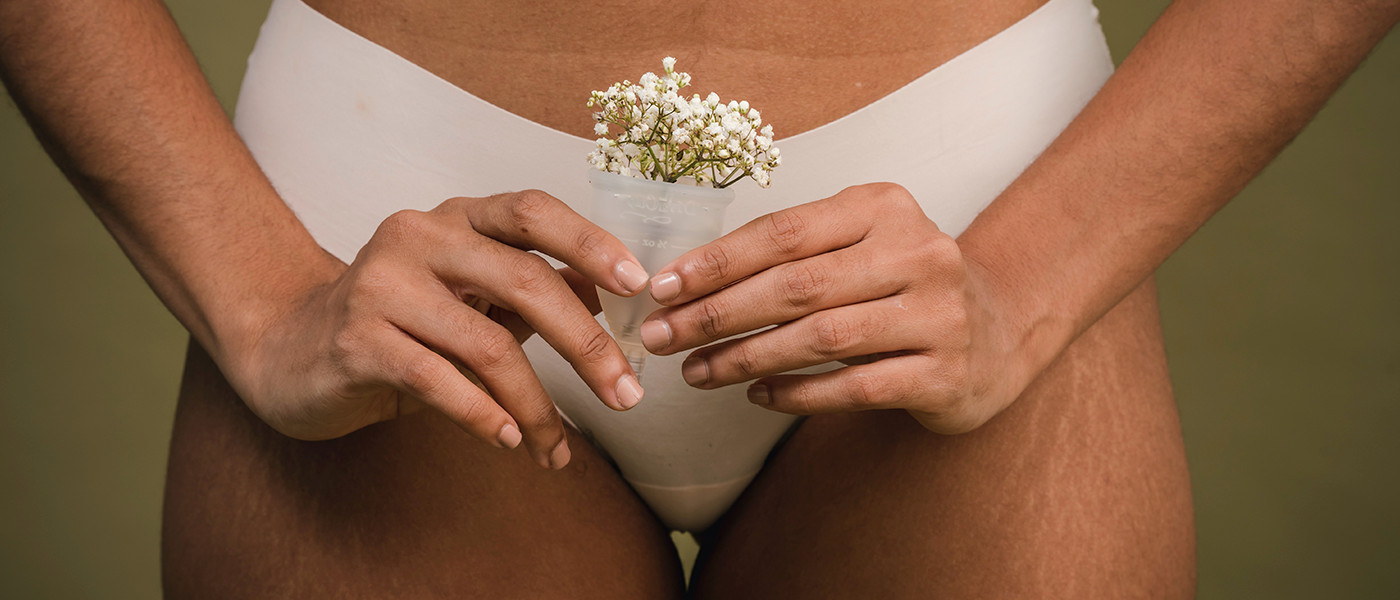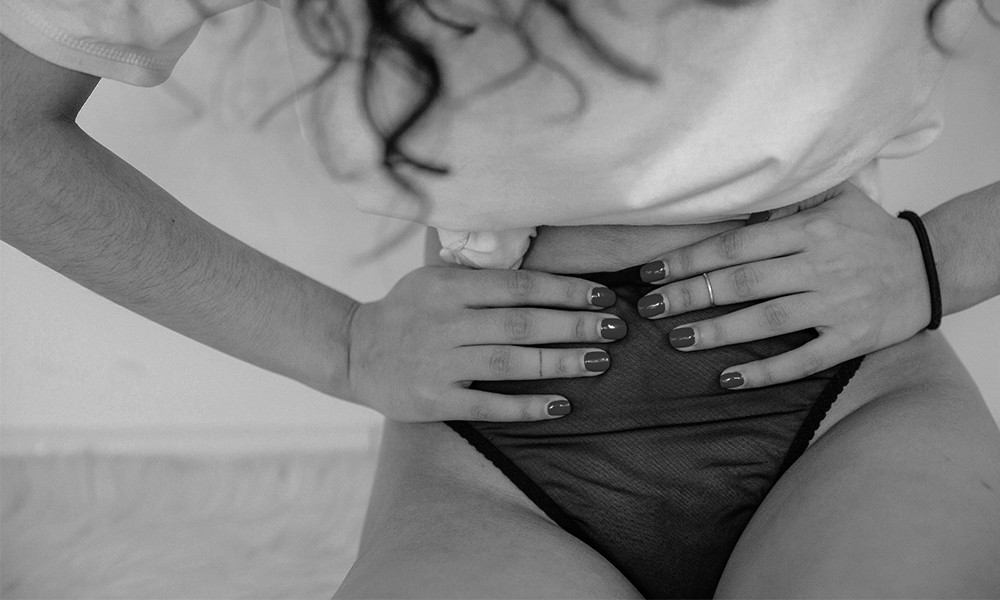PMDD | My menstruator’s guide to mental health

Unpacking the mysterious premenstrual disorders of a menstruator
Moodswings. Depressive spirals. Feeling dizzy before a period. It is what a “normal” day for a menstruator can look like, including those with PMDD (starting on day 21).
Some people feel little to no pain, while others are in bed for days, depending on what they consider a “normal” day. Some people get dizzy before a period, experience insomnia and anxiety around day 21 of their 30-day monthly cycle, or just a few days leading up to one’s period.
Most everyone has it drilled into their brains that periods = pain, and for some, they’ve never had a “normal day” regarding their menstrual health. It might be common to feel fatigued or dizzy before a period, but that is far from balanced menstrual health.
Especially in the days leading up to one’s menstruation, many menstruators experience some of the classic symptoms that can range from mood swings to insomnia to headaches, fatigue, and even weight gain. Commonly known as Premenstrual Syndrome (PMS), most menstruators experience these symptoms.
While many people wouldn’t describe their menstrual cycle as a pleasurable experience, some people describe it as going through hell.
Being physically dizzy before a period or mentally dizzy before a period can mean that you or a loved one is suffering from something more than just regular PMS.
If it’s taking an undeniable toll on one’s mental health, it is indicative that they are suffering from a cyclical, hormonal mood disorder, often unknowingly.
PMDD
But before we dive into PMDD, let’s have a closer look at the ebbs and flows of the menstrual cycle to paint the not-so-pretty picture of Premenstrual Dysphoric Disorder entirely.

The menstrual cycle
Every month, women and AFAB (assigned female at birth) people go through a whole set of changes within our bodies.
We go through 4 phases, which can also be considered seasons! Even if you’re on birth control, keep reading! This information will STILL apply to you because if you have a womb, you are always operating in a lunar cycle. Always.
The menstrual phase
Your menstrual phase is the first stage of your cycle, starting once your egg from the previous cycle is not fertilized. Now, your estrogen and progesterone levels drop. The thickened lining inside your uterus sheds- and the menses begin!
The follicular phase
The next phase starts when a menstruator’s brain releases the so-called follicle-stimulating hormone (FSH), and you are thriving! Nothing is typically holding one back during this time, and you’re taking advantage of every single one of your normal days. The FSH makes sure your body produces new eggs each month.
The healthiest egg starts a process that results in a spike of estrogen. So, because these follicles are fighting to be chosen over one another, the follicles are actually the cause of estrogen production.
Because every body is different, this phase can last between 11 to 27 days. Being one of your normal days, one typically wouldn’t be plagued by a premenstrual disorder or discomfort from their menses.
The follicular phase has much greater variability than the luteal phase in duration. The body recruits a certain number of eggs to be led towards ovulation, which changes from menstruator to menstruator.
Please note, however, that there can be an overlap of the menstrual phase and follicular phase, too, so even though there are 4 phases, we can generally refer to it as two phases: the follicular and the luteal phase.
The ovulation phase
Once your estrogen levels are high, your brain is triggered to release luteinizing hormone (LH).
This is the start of your ovulation.
Although this is the only time you can get pregnant, it is essential to know that depending on the quality of one’s cervical mucus, it can expand the lifetime of the sperm.
If the mucus isn’t in a great state, this means that the sperm will only last a few hours to a day. However, if the mucus is of good quality, then the sperm can actually survive for 5-6 days!
On average, the days in a month one can get pregnant are usually around 6. And if that doesn’t happen, then you are well on your way to getting your period.
If this is the only takeaway from this article, then so be it!
A menstruator’s fertility is a biomarker of their health status.
In other words, menstrual health and fertility health reflect one’s overall health.
This connection is absolutely key if you have a uterus.
The luteal phase
This phase is critical for people that suffer from PMDD. But more about that in a second!
During the last phase of your cycle, your body starts forming the corpus luteum, which produces both estrogen and progesterone, but it’s mostly progesterone that’s produced.
If you don’t get pregnant, the unfertilized egg will shrink and lead to decreased levels of estrogen and progesterone, usually around day 21 of the cycle.
On a normal day, you might start to experience PMS. But for other menstruators, a normal day can quickly become dark with experiences of feeling mentally dizzy before a period. The next thing you know, you’re on a hellish rollercoaster ride that doesn’t come to a halt until you’ve flown into your menses again.
Below is a visual summary of the dip that occurs around day 21, and the rise and fall of hormones before that period. Everyone’s cycle is different, so it is imperative to get in tune with your body and notice any shifts that occur around day 21 with your mood and your mental health.
Getting in tune could look like tracking your cycle with an app to better understand your cycle and know where you are in your cycle.
Get to know what a normal day looks like for you and when you’re experiencing abnormalities. Even the brightest and bubbliest personalities can become dull and hopeless with premenstrual disorders, leaving oneself with brain fog and feeling mentally dizzy before a period.
Source: HelloClue
Is it PMS, PME or PMDD?
So far, everyone on the face of this planet has recognized PMS while still keeping the stigma of PMS alive and well.
But did you know there are other premenstrual disorders you could suffer from?
They are rarely discussed (even in the medical field!), and as a result, many people are left undiagnosed for years in life-threatening physical and mental pain.
As someone who has suffered from a premenstrual disorder (PMD) that is barely spoken about, it’s crucial to educate others about all types of premenstrual disorders to better spread awareness and help others heal from their medical condition.
If you experience debilitating symptoms (like feeling depleted of energy or mentally dizzy before a period) that negatively impact your daily life, and take away from your bank of “normal” days, then something is not right.
Nearly 75% of menstruating people suffer from PMS, which are the symptoms before our period that affect us psychologically as well as physically.
Then, there is Premenstrual Dysphoric Disorder or PMDD.
Officially, between 3-8% of all menstruating people suffer from PMDD, but research suggests it’s rather 13-18%, with many people suffering in silence. And there’s a possibility that those numbers are closer to 1 in 4 menstruators having this medical condition, but unfortunately, the medical research just isn’t there.
So that we don’t delve into the medical gender gap, let’s move on!
So what exactly is PMDD, and how is it different from PMS?
PMDD is a cyclical, hormonal mood disorder with symptoms arising during the premenstrual or luteal phase of the menstrual cycle, which subsides within a few days of menstruation. The disorder is a severe adverse reaction in the body to the natural shifts of estrogen and progesterone.
The ebbs and flows of these sex hormones can cause real psychological harm around day 21 of your monthly cycle, but, as it goes, it doesn’t have the same effect during your follicular phase or your normal days.
While most people dread the moment their period starts, for individuals suffering from PMDD, it is a blessing… It means that they have survived day 21 onwards, and their symptoms (like feeling mentally dizzy before a period) are about to fade away, getting back to their version of normal and their “normal” days (that are, unfortunately, quite limited).
So, what symptoms are we talking about?
Symptoms of PMDD usually kick in 1-2 weeks before menstruation, but typically around day 21. Symptoms vary but often include heavy mood swings, depression, intense anger, suicide ideation, anxiety, fatigue, feeling dizzy before a period, and much more.
For a comprehensive list of symptoms, check out IAMPD.
But beyond the feeling of being dizzy before a period, let’s hear from others and their experiences with PMDD.
Katherine H., 22, describes her feelings during PMDD as “extremely depressed and anxious, having much more frequent panic attacks, and was super sensitive and lonely. I was even suicidal, which was terrifying. I didn’t make the connection that it was related to my period but thankfully a close friend did.”
Feeling suicidal is a common symptom. A staggering 30% of PMDD sufferers will try to commit suicide. Yes, it‘s that serious.
Amy S., 43, says “In the past, PMDD almost made me suicidal and totally broke my spirit. Yes, it was that bad. Every month.
Eventually, I got tired of being a ‘crazy PMS woman’ and decided I needed to fix this. Since I don’t like to take pharmaceuticals, I branched out to homeopathic remedies. It’s a lot better now but I still have my hard days.”

How is PMDD diagnosed?
That’s where things get a bit difficult- because there isn’t a simple blood test one can take to confirm a diagnosis. The average span from showing symptoms to diagnosis is 12(!) years.
One way to determine whether you are affected by PMDD is to keep a detailed diary of your symptoms (like feeling dizzy before a period) over the course of at least 2-3 months. People affected by this disorder tend not to associate their mental health with their monthly cycle.
This is why journaling would be your best way to find out if you suffer from PMDD because you can look to see how you’re feeling from day 21 onwards.
Of course, to rule out any other medical problem, it is advised to have your blood work done and ask for a doctor specializing in gynecology or endocrinology.
Here you can also download printable trackers and apps for diagnosing PMDD.
But there is another disorder, often left out of the conversation around menstrual health.
Premenstrual Exacerbation (PME) is often misdiagnosed as PMDD, although it is a different type of disorder.
PME refers to the worsening of symptoms from another medical condition one has, such as major depressive disorder, anxiety disorder, or other mental health disorders.
Let‘s have a look at Evie Muir, and her story of conquering life with PME:
“In the week leading up to, and the week during my period, I struggle to differentiate between what’s real and what isn’t. I’m paranoid and hypersensitive to perceived threats. I’m unable to regulate my emotions and cry uncontrollably and relentlessly.
Navigating everyday situations like work and socializing becomes impossible and I’m then consumed with guilt over being unable to uphold such responsibilities.“
Do you notice the similarity to PMDD? That‘s where it gets tricky.
How can you tell whether you have PMDD or PME?
Currently, the only method is checking off symptoms, jotting down the severity with each symptom that arises. If the symptoms of an ongoing disorder worsen leading up to one’s period (around day 21 of your monthly cycle), these symptoms are considered to be PME.
Here’s where it gets complex!
Let‘s take a depressed mood symptom as an example.
It‘s clearly a symptom of PMDD, BUT it’s also a symptom of clinical depression. The issue here is to fine-tune your awareness of the timing.
Do you experience a depressed mood leading up to your period, or does the premenstrual phase make your depressed mood stronger?
So is it PMDD or PME?
- PMDD – a menstruator’s symptoms show in the luteal phase (day 21- 30)- the phase leading up to one’s period- and slowly disappear within a few days of starting one’s period.
- PME – the menstruator’s symptoms from their ongoing medical condition are present throughout the entire monthly cycle but become more severe in the luteal phase (day 21-30).
- PMDD and PME – the symptoms of an ongoing medical condition are present throughout the entire monthly cycle and worsen in the luteal phase (day 21-30). There will also be some symptoms that arise only in the luteal phase and subside around the time of your period.
So you see, the line between these different disorders isn’t always clear, but as awareness rises, so does research on these disorders.
What causes PMDD in a menstruator?
Many of those who suffer from PMDD and related disorders find themselves asking:
“Why me?”
The truth is, research in the premenstrual health space hasn’t come far enough to understand the complexities of what happens to your body when it’s on day 21 of your menstrual cycle, and as a result, it can be pretty uninspiring!
As if it wasn’t already depressing enough having PMDD/PME!
Although experts still try to figure out the cause of PMDD, many believe the disorder is your body’s response to the hormones that are decreasing during a menstruator’s luteal phase, which typically encompasses day 21-30.
Your body naturally experiences different hormonal levels of estrogen and Your body naturally experiences different hormonal levels of estrogen and progesterone, and those changes could affect your serotonin levels and, consequently: your mood.
However, other issues probably influence the development of PMDD too…
Research conducted in 2017 discovered that genetics could play a significant role in the development of PMDD.
They argue that sufferers of PMDD have genetic changes that influence the cells’ reaction to hormonal changes. The cells overreact to hormonal changes and cause PMDD symptoms.
This can also theorize the idea that if one’s mom had “crazy PMS” or episodes of feeling dizzy before a period, you two could share a similar experience.
There is another theory that helps to uncover the mystery of the PMDD root cause(s).
Researchers have emphasized trauma as the root cause of PMDD.
In 2011, it was discovered that PTSD and PMDD are correlated. Furthermore, PMDD and PTSD are independently associated. So what does that mean?
It means that uterus-carrying people who suffer from PMDD often experienced hIt means that uterus-carrying people who suffer from PMDD often experienced heavy trauma, which may or may not result in PTSD.
This is a ground-breaking discovery in PMDD research: Trauma can result in individuals developing PMDD!

Trauma from your mama
When you think of trauma, you might think of soldiers returning from war, which is totally valid! However, trauma can emerge from many different experiences, and there is a wide array of traumas one can experience, thus having a wide array of impacts on your body.
Some trauma can result from physical, emotional, verbal, spiritual, or sexual abuse/harassment.
Trauma experienced as a child is strongly linked to PMDD. Studies clearly indicate that the severity of premenstrual symptoms increases with high levels of childhood trauma.
When you experience trauma, it affects your ability to regulate emotions. If the trauma occurred at a young age, the effects on emotional regulation skills could be long-term.
This means people who have experienced trauma could be ill-equipped to process certain hormonal and physical changes in their bodies.
Not to mention their ability to manage stress!
Trauma affects your body on a cellular level. Therefore, when there is damage to our cellular health, we see it manifest in issues with our general health. Which of course, includes menstrual health!
A normal day for someone with PMDD looks vastly different than a normal day for a person that has PME, or a normal day for one with balanced menstrual health. We often don’t think about enhancing our “normal” days, because our bodies are too preoccupied with keeping us safe.
So when thinking about trauma, we have to explore what an ideal “normal” day looks like to start to envision a healed version of ourselves that is no longer suffering. Asking yourself what a normal day is can be a great way to actually redefine our normal days.
So that our normal day becomes filled with gratitude, lightness, laughter, and love. I think everyone could use more of that!
“Lady time”
Other people might express the root cause of PMDD stems from the toxic masculinity that is prominent in society.
Although significant progress has been made, topics including menstruation, periods, female reproductive health, or what happens on day 21 of your cycle are not spoken about enough. Heck, some people still refer to menstruation as “lady time”… in 2022!
Societal pressure and isolation during one’s period can strongly influence the development of PMDD.
Many menstruators with PMDD/PME experience negative thinking styles. When you’re around day 21, negative self-talk could influence depressive symptoms and feelings.
Additionally, feeling negative about yourself can result in frustration, and increasing anxiety, leaving those who suffer from PMDD feeling even more isolated which can intensify PMDD symptoms, starting on day 21.
PMDD desperately requires more medical research in order to draw definite conclusions. We are only at the beginning of understanding this disorder and how one develops it.
Where you can get help
Suffering from PMDD myself, I understand that realizing you have this disorder is the first BIG step in a long healing journey.
Luckily, there are some resources available in this article in the hopes that they will help you or a loved one with their menstrual health journey.
- Advocate for yourself! PMDD/PME doesn’t have to be a lifelong curse. It will force you to develop the skill of self-advocacy and self-efficacy because, to get help, you may encounter medical gaslighting along the way. Dump any practitioner that doesn’t give you the time of day. You deserve to be heard! There are many specialists out there, including Naturopaths, Functional Medicine doctors, Ayurvedic doctors, and mental health providers that can get you the help you need and get you to have more normal days.
- IAPMD is a leading organization in researching, diagnosing, and helping those suffering from PMDD and related PMDs.
- “period“ is an organization that supports those who suffer from PMDD, and now offers health coaching services.
- Ovaryit
- Suffering from PMDD can get pretty lonely. Connect with others and share your experiences- no one should go through all of this alone.
Notes from the author
It has been a battle, a journey, and a rollercoaster having PMDD for the past five years. From self-diagnosis to feeling absolutely hopeless about my PMDD and the lack of a known ‘cure’ to finally seeing the light at the end of the tunnel once I turned to a holistic approach to healing from my PMDD, it has been quite the journey!
When I founded my organization “period,” I was so glum about the available PMDD statistics and disappointed in the lack of research on the medical condition that was ruining my life.
However, once I started turning to resources instead of focusing only on my problems, there was a major shift in my mindset toward this medical condition. I thought about what I can do, not what I can’t do.
Regardless of where you are in your menstrual health journey, know that you are not alone. For some, perhaps cosmic reason, YOU are reading this article.
In some ways, it doesn’t matter that you have PMDD or PME. What does matter is that you’re knowledgeable about these severe medical conditions and that you have resources to share with someone that is going through the excruciating pains of having PMDD or PME.
Resources that can take menstruators away from feeling mentally dizzy before a period- having not just a “normal day” but a fantastic day, living in their optimal health!
A menstruator’s hope for the future
There are new studies coming out, and there are various online social groups where you can find other PMDD/PME peeps for support.
There are discussions about menstrual health in the workplace and other spaces, and there are people out there that have the knowledge and compassion to help you or someone you love in this time of suffering. I consider my PMDD to be one of the greatest blessings in my life.
Because of my PMDD, I have learned about my own body, my history, my traumas, and ways to overcome my past through integrative and holistic therapies, functional medicine, and much more.
It connected me to menstruators quite literally all over the world that share the It connected me to menstruators quite literally all over the world who share the same medical condition. Heck, it’s why, when I was 23 years old, I had an article published on NASDAQ about PMDD!
It’s because adversity transformed into opportunity. And while I’m not calling on everyone to be a social entrepreneur, here’s one thing you can do.
Open your ears and open your heart.
Deep listening and understanding of others’ pain will go farther than you know.




